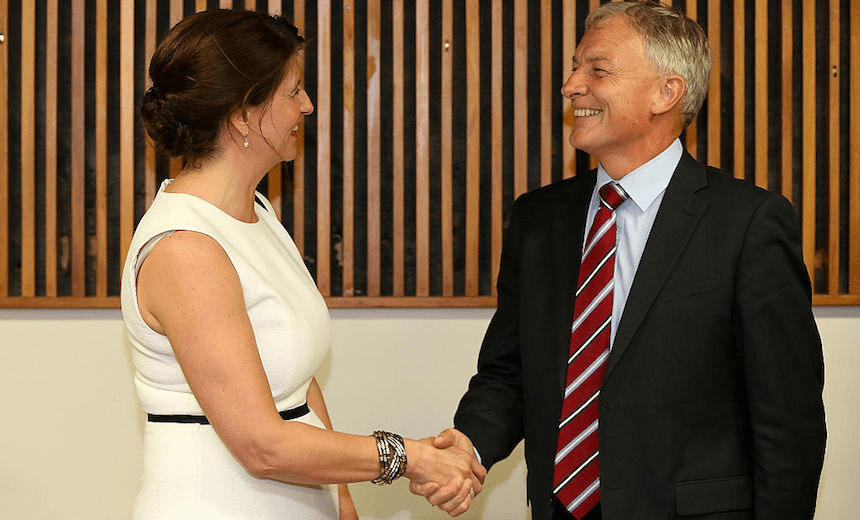This morning ex-Xero MD Victoria Crone announced a strong response to the housing crisis, one which squarely targeted the land-bankers and ‘property investors’ holding Auckland to ransom. This is a big deal, writes Duncan Greive.
Auckland is, as everyone but the National cabinet acknowledges, in the grips of a diabolical housing crisis, with effects running from the tragic (people sleeping in cars) to the somewhat less tragic (boomers out east potentially getting some garden shade). Until this morning we’ve been stuck in an unfortunate feedback loop, wherein local government says Central Government are the only ones with power to fix it and Central Government says there’s nothing to fix. And so on.
This morning, as well as dawning crisp and clear in our largest city, also brought with it bold statements from a seemingly unlikely source: Victoria Crone, the ex-Xero MD running for mayor and thus the default candidate of business and the right. She appeared in that coveted 7-7.30am agenda-setting interview spot on Morning Report to announce her intention to deploy a range of measures including “targeted rates, rezoning, a time limit on developments and improving the council’s consenting process,” as host Guyon Espiner characterised it.
“We’re 20,000 homes short of where we need to be and that figure is growing every year,” she said. “We need to use every single lever.”
Listen to the full interview:
While delivered in a pleasantly calm and matter-of-fact tone, this was a fairly shocking deviation from at least two narratives. Firstly, as Crone is the candidate of the right, it would make sense for her to be operating within the confines of the government’s narrative: that a few tweaks and it’ll be Lambourghinis and helicopters for all. Secondly, and more intriguingly, this represents a fairly abrupt deviation from the right’s long-treasured idea that property rights are the most sacred and unassailable of all human rights.
This argument, which admittedly has an attractive simplicity, suggests that the land we own is ours to do with as we see fit. And that any attempt by government to interfere with that right demands a response somewhere on a spectrum between “hand-writing a letter to editor of the New Zealand Herald” and “attempting to secede through peaceful or violent means”.
Crone’s contention, then – that the needs of the community outweigh those of the individual – is somewhat radical. Particularly given that this isn’t a gentle caress of a policy, like our sort-of Capital Gains-ish tax. It’s a hammer:
“The biggest area of concern for me is land-banking,” said Crone, to loud applause in my suburban bathroom. And how would she put a stop to it? “That would be working out what is the total value of the land once it’s developed and putting something like 50% of the rating value on.”
“It has to be significant – we have to provide a stick.” That is a very big stick. The decades’ vacant lot running between 27 Fort Street and 20 Shortland Street in downtown Auckland has been a Wilson’s carpark as long as I can remember. Were it to attract rates like the Vero Centre up the road, that situation would be fiscally untenable for all but the most wealthy and obtuse owners.
Crone went on to say that empty dwellings might receive a similar treatment. She plans to target houses which don’t show habitation via their water bills within a six month period. But, spluttered Espiner – doing a reasonable job of pretending he gave a shit about people wealthy enough to own long-term unoccupied beach houses – what about bach owners? “If it’s empty for seven months,” she replied “…and it’s a bach, would you get slapped with a tax.” Clean, simple, no outs (beyond a neighbour willing to turn your tap on for you periodically).
What’s so fascinating about this change in outlook is that Crone is not some rogue agent like John Palino or Donald Trump, freestyling policy on a whim. She’s connected and coached – she’s mentored by Paula Bennett, the Minister most under fire for the crisis – and it’s literally impossible to countence the idea that she wouldn’t have consulted widely with business and political leaders before announcing such a policy. This is why it is so meaningful.
In some ways it perversely helps the government, in implying that solutions to what she tellingly characterised as a “serious situation” – not a crisis, of course – could be found locally. Which is another way of saying that what we’re seeing at Te Puea Marae and all across the isthmus is, in fact, Auckland’s problem and fault, not the government’s.
Bullshit. Or at least a long way from accurate. But ultimately, who cares? The fact we now have a candidate talking about doing something about landbanking and targeted rates from the right is cause for celebration everywhere in this fine city.
Well everywhere except the opposition.
“I think we need to be a lot more scientific and creative than that,” Deputy Mayor Penny Hulse said earlier. “I don’t think we need to be punitive… I’d like to see if we can work with community agencies…” I fell asleep at that point, so cannot tell you what she said afterwards. The man who would be her boss, Phil Goff, was similarly gazumped: “I’d need to be persuaded that you wouldn’t need a mass bureaucracy in order to make that work.” The Labour candidate raising the spectre of a “mass bureacracy” is the surest sign you’d need that this was not in the original script.
The announcement alone won’t change the outcome of the election, of course. But in both policy and its delivery Crone took a step forward this morning – and as a result we may have a Mayoral race worth watching after all. More importantly, some long-held assumptions just got jettisoned, and assuming the talk becomes action, our city should be much the better for it.





